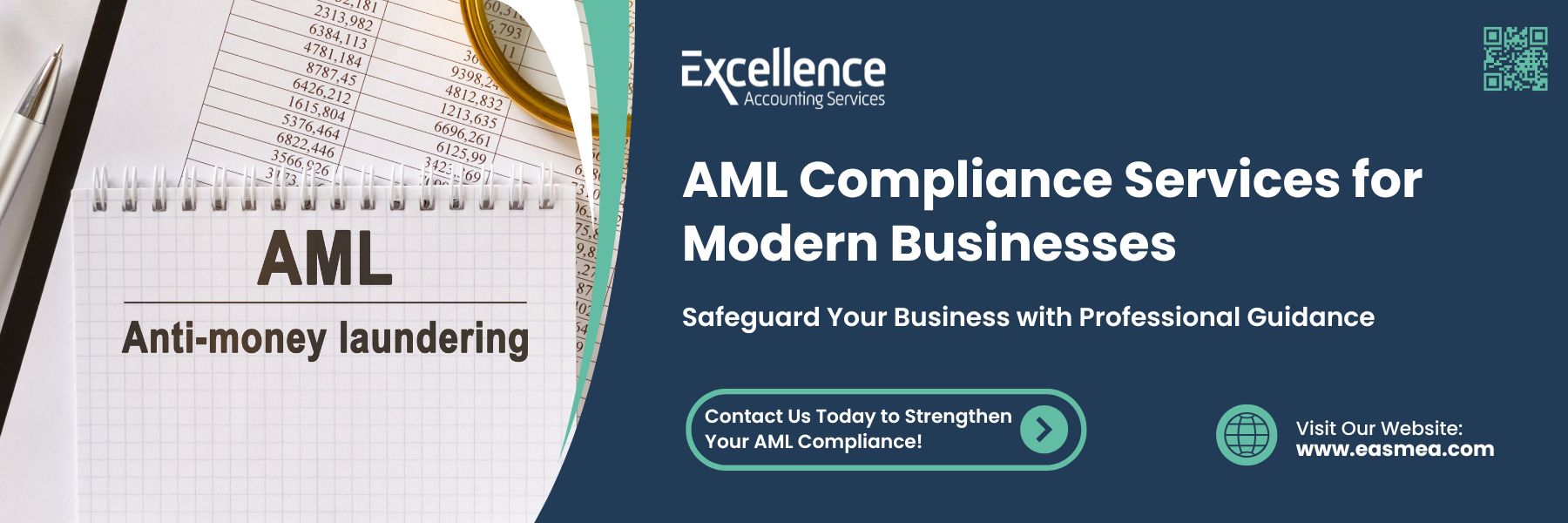Introduction
AML Compliance in UAE (Anti-Money Laundering Compliance) is a cornerstone of financial security and integrity for businesses worldwide. It involves implementing robust policies and controls to prevent money laundering, terrorist financing, and other financial crimes. With global financial networks becoming increasingly interconnected, the importance of AML compliance has never been greater.
For businesses in the UAE, adherence to AML compliance regulations is not only a legal obligation but also a strategic necessity. In a region with significant economic activity and international transactions, staying compliant ensures smooth operations and fosters trust among clients, investors, and regulators.
This guide is designed to help businesses navigate the complexities of AML compliance. From understanding regulatory requirements to adopting best practices, it offers actionable insights for establishing an effective compliance framework. Whether you are a startup or a multinational corporation, mastering AML compliance safeguards your business against legal penalties and reputational risks while enhancing operational transparency.
Moreover, the dynamic nature of financial crimes demands continuous vigilance. Businesses must not only comply but also adapt to evolving threats by integrating advanced technologies, fostering a compliance culture, and maintaining rigorous monitoring systems. By doing so, companies can transform AML compliance from a regulatory task into a strategic advantage.
Key Takeaways
- AML Compliance involves adhering to regulations to prevent money laundering and terrorist financing.
- Businesses must implement customer due diligence (CDD), monitoring, and reporting systems.
- Non-compliance can result in hefty fines, operational disruptions, and reputational damage.
- Excellence Accounting Services provides tailored solutions to meet AML compliance requirements seamlessly.

What is AML Compliance?
AML Compliance refers to the set of procedures, policies, and controls that businesses implement to detect and prevent money laundering and financial crimes. These regulations are governed by international bodies like the Financial Action Task Force (FATF) and local authorities to ensure transparency and accountability in financial transactions.
At its core, AML compliance involves creating a secure financial environment by addressing potential risks and vulnerabilities. Businesses are required to identify and verify the identities of their clients, monitor transaction patterns for unusual activity, and report any suspicious behavior to the relevant authorities. These measures help mitigate the risk of financial systems being exploited for illegal purposes.
Furthermore, AML compliance extends beyond financial institutions. It applies to sectors like real estate, trading firms, and even non-financial businesses that handle significant transactions. Adopting a proactive approach to AML compliance not only ensures legal adherence but also strengthens a company’s operational integrity and market reputation.
Core Components of AML Compliance
- Customer Due Diligence (CDD): Verifying customer identities and understanding their transaction behaviors to prevent illicit activities.
- Risk Assessment: Identifying high-risk customers or transactions and applying enhanced due diligence to minimize exposure.
- Transaction Monitoring: Implementing systems and tools to detect and flag suspicious patterns or activities in real time.
- Suspicious Activity Reporting (SAR): Reporting unusual or potentially fraudulent transactions to the relevant regulatory authorities.
- Record Keeping: Maintaining comprehensive and accurate records of transactions, customer information, and compliance activities for audits and regulatory checks.
Effective AML compliance safeguards businesses from legal penalties, enhances operational transparency, and builds trust with stakeholders.
Benefits of AML Compliance
AML compliance offers businesses significant advantages beyond merely meeting legal requirements. By implementing effective AML frameworks, companies safeguard their operations and build robust relationships with stakeholders. Below are the key benefits:
| Benefit | Description |
|---|---|
| Legal Compliance | Avoid legal penalties and operational disruptions by meeting regulatory standards. |
| Reputational Integrity | Demonstrates a commitment to ethical business practices and financial transparency, boosting market credibility. |
| Enhanced Security | Protects against financial crimes such as money laundering, fraud, and terrorist financing, ensuring a secure operational environment. |
| Global Credibility | Aligns with international standards, fostering trust and enabling partnerships with global organizations. |
| Customer Confidence | Builds trust with clients and stakeholders by ensuring secure and transparent financial transactions. |
| Operational Efficiency | Streamlines internal processes with advanced AML systems, saving time and reducing errors. |
| Risk Mitigation | Identifies and manages high-risk customers and transactions, reducing potential exposure to criminal activities. |
| Audit Preparedness | Ensures businesses are audit-ready with well-documented and transparent records, minimizing disruptions. |
| Sustainable Growth | Strengthens the foundation for long-term business success by aligning operations with best practices and ethical standards. |
Implementing AML compliance isn’t just about adhering to regulations—it’s about building a resilient, trustworthy, and future-ready business.
How to Handle AML Compliance Effectively
Ensuring AML compliance is a multi-faceted process that requires a structured and proactive approach. Businesses must integrate policies, training, and advanced technology to detect and prevent financial crimes effectively. Below are some expanded strategies to enhance your AML compliance framework:
1. Develop a Robust AML Policy
- Create a clear and comprehensive policy outlining procedures for customer verification, transaction monitoring, and risk assessments.
- Include provisions for identifying high-risk customers and implementing enhanced due diligence where required.
- Regularly update the policy to reflect changes in local and international AML regulations to ensure relevance and effectiveness.
2. Train Your Team
- Conduct frequent and detailed training sessions to familiarize employees with AML obligations, including identifying and reporting suspicious activities.
- Incorporate real-world case studies and simulations to enhance practical understanding and decision-making skills.
- Develop role-specific training programs to ensure every department understands its responsibilities in maintaining compliance.
3. Implement Advanced Technology
- Utilize sophisticated software to automate transaction monitoring, flag unusual activity, and streamline the generation of Suspicious Activity Reports (SARs).
- Leverage Artificial Intelligence (AI) and Machine Learning (ML) tools to predict high-risk behaviors and enhance the efficiency of your compliance systems.
- Ensure data security and compliance by integrating encryption and secure cloud-based systems into your AML processes.
4. Conduct Regular Audits
- Schedule periodic internal and external audits to identify and address gaps in your compliance systems.
- Use audit findings to refine your policies and ensure consistent adherence to regulatory standards.
- Maintain meticulous records of all compliance activities to facilitate regulatory inspections and demonstrate your commitment to AML regulations.
5. Foster a Culture of Compliance
- Promote an organizational culture that prioritizes ethical behavior and compliance at all levels.
- Encourage employees to report potential risks or violations without fear of reprisal by establishing a whistleblower policy.
- Engage leadership to set a strong example, reinforcing the importance of AML compliance in achieving long-term business goals.
Why Partner with Excellence Accounting Services?
Excellence Accounting Services offers unmatched expertise in navigating the complexities of AML compliance, making it the ideal partner for businesses of all sizes. With a proven track record in financial regulatory adherence, their team ensures your company meets and exceeds compliance standards while streamlining your operations.
Key Advantages of Partnering with Excellence Accounting Services:
- Custom AML Solutions: Tailored policies and frameworks that address your industry-specific challenges and risk factors.
- Expert Knowledge: A team well-versed in UAE’s AML laws and global regulatory standards, ensuring full compliance and avoiding penalties.
- Advanced Technology: Integration of cutting-edge compliance tools, including AI-powered transaction monitoring and reporting systems.
- Proactive Training: Regular employee training sessions to instill a culture of compliance and equip your team with the skills to identify and mitigate risks.
- End-to-End Support: Comprehensive assistance from policy creation and audits to technology implementation and reporting.
By choosing Excellence Accounting Services, businesses gain a trusted partner dedicated to protecting their reputation, ensuring regulatory compliance, and paving the way for sustainable growth in today’s competitive market.
“Simplify your AML compliance journey with Excellence Accounting Services — your partner in financial security and operational integrity.”
FAQs About AML Compliance
AML Compliance refers to the comprehensive set of measures, policies, and controls that businesses implement to detect, prevent, and report money laundering and other financial crimes. These regulations are designed to safeguard financial systems from being exploited for illegal purposes such as terrorist financing, tax evasion, or fraud.
At its core, AML compliance encompasses customer verification, also known as Know Your Customer (KYC), ongoing transaction monitoring, risk assessments, and the reporting of suspicious activities to regulatory authorities. Businesses are required to maintain detailed records to ensure transparency and to facilitate audits when necessary.
Moreover, AML compliance extends beyond financial institutions to include sectors such as real estate, luxury goods, and cryptocurrency exchanges, where significant financial transactions occur. Implementing robust AML frameworks not only ensures legal adherence but also enhances the business’s reputation, builds trust among stakeholders, and supports long-term growth by mitigating financial risks effectively.
AML Compliance is critical for businesses as it serves multiple essential purposes. Firstly, it ensures adherence to legal frameworks, protecting companies from severe penalties, operational disruptions, and legal repercussions. By implementing robust AML policies, businesses can effectively prevent financial crimes, including money laundering and terrorist financing, which could otherwise exploit their operations.
Moreover, compliance enhances a company’s reputation, signaling a commitment to ethical practices and transparency. This fosters trust among stakeholders, including customers, investors, and regulatory authorities, which is crucial for long-term growth and success. Lastly, AML Compliance strengthens operational integrity by creating a secure financial environment, reducing risks, and enabling businesses to focus on their strategic goals without concerns about regulatory breaches.
AML regulations apply to a wide range of industries, not just traditional financial institutions. Businesses in sectors like real estate, trading firms, cryptocurrency exchanges, and high-value goods dealers must adhere to these regulations. Companies operating in these areas handle significant financial transactions, making them susceptible to money laundering risks.
Additionally, non-financial businesses and professions such as legal advisors, accountants, and auditors also fall under AML compliance requirements when they manage client funds or transactions. Compliance is critical for these entities to safeguard their operations, maintain trust, and avoid severe legal penalties.
Failure to comply with AML regulations can have severe consequences for businesses. Non-compliance often results in hefty financial penalties imposed by regulatory authorities, which can strain a company’s resources and disrupt operations. In addition to fines, businesses may face operational shutdowns, especially if the violations are deemed severe or repetitive.
Beyond the financial impact, non-compliance can severely tarnish a company’s reputation. Losing the trust of stakeholders, including investors, clients, and partners, can lead to long-term damage that is difficult to repair. Regulatory breaches also increase scrutiny from authorities, making future operations more challenging and costly.
To avoid these repercussions, businesses must prioritize AML compliance by implementing robust policies, leveraging advanced technology, and fostering a culture of ethical practices. Staying compliant not only safeguards against legal penalties but also enhances the organization’s credibility and sustainability in the marketplace.
The penalties for failing to comply with AML regulations in the UAE are severe and vary based on the nature and severity of the violation. Businesses found in breach of AML laws can face substantial financial fines that range from hundreds of thousands to millions of dirhams, depending on the scale of non-compliance. In extreme cases, regulatory authorities may revoke business licenses, effectively shutting down operations.
Additionally, non-compliant entities often experience heightened scrutiny from regulators, which can lead to prolonged audits, operational delays, and further financial strain. Beyond financial penalties, the reputational damage associated with non-compliance can be devastating, eroding stakeholder trust and deterring potential investors or partners. Criminal charges may also be filed against responsible individuals within the organization, including directors and key personnel.
To mitigate these risks, businesses must prioritize AML compliance by adopting robust policies, implementing advanced monitoring tools, and staying updated with regulatory changes. Ensuring adherence to AML standards is not just a legal obligation but a vital step toward long-term sustainability and growth in a competitive market.
Suspicious Activity Reports (SARs) are critical tools in the fight against financial crimes. These official documents are filed with regulatory authorities whenever a business or financial institution detects unusual or potentially fraudulent transactions. SARs serve as a mechanism to alert authorities to activities that may indicate money laundering, terrorist financing, or other illicit financial behaviors.
The content of a SAR typically includes details about the parties involved, the nature of the suspicious activity, and any supporting evidence that can aid in further investigation. Filing a SAR is not an accusation but a proactive step to ensure compliance and prevent the misuse of financial systems.
Businesses across various sectors, including banking, real estate, and trading, are required to file SARs promptly to demonstrate their commitment to anti-money laundering (AML) regulations. Proper training and the use of advanced monitoring tools ensure that suspicious activities are identified and reported efficiently, protecting both the business and the broader financial ecosystem.
Excellence Accounting Services provides comprehensive solutions to help businesses navigate the complexities of AML compliance with ease and confidence. Their team of experts specializes in crafting custom policies tailored to the unique needs of each business, ensuring adherence to both UAE regulations and international AML standards.
By leveraging advanced tools, including AI-driven transaction monitoring and secure reporting systems, they enhance the accuracy and efficiency of compliance processes. Excellence Accounting Services also offers hands-on support with employee training programs, helping teams understand their roles in maintaining compliance and identifying suspicious activities.
From initial risk assessments to audit preparation, Excellence Accounting Services delivers end-to-end guidance, enabling businesses to safeguard their operations, avoid penalties, and build trust with stakeholders. Their proactive approach ensures that companies remain compliant in a dynamic regulatory environment while focusing on sustainable growth.
AML policies should be reviewed and updated annually to ensure they align with the latest regulatory requirements and industry best practices. However, businesses should also revise their policies whenever significant regulatory changes occur or when new risks and vulnerabilities are identified within their operations.
Regular updates demonstrate a proactive approach to compliance, ensuring that the organization remains resilient against evolving financial crime tactics. In dynamic environments like the UAE, where AML regulations are frequently updated to align with global standards, staying current with these changes is not just advisable but essential. Continuous reviews and improvements in AML policies reinforce trust with stakeholders and safeguard businesses from potential penalties or reputational risks.
Technology plays a transformative role in strengthening AML compliance by automating processes, enhancing accuracy, and improving efficiency. Advanced tools like AI-powered monitoring systems are capable of detecting suspicious activities in real-time, enabling businesses to act swiftly and mitigate potential risks. Machine learning algorithms analyze vast amounts of transaction data to identify unusual patterns that may indicate money laundering or fraudulent behavior.
Moreover, technology streamlines the generation and submission of Suspicious Activity Reports (SARs), ensuring regulatory authorities are informed promptly and accurately. Tools like secure cloud-based platforms enhance data storage and accessibility, facilitating seamless audits and compliance reviews. By integrating cutting-edge software, businesses can also implement predictive analytics, which helps forecast potential high-risk activities and proactively address vulnerabilities.
In addition to detection and reporting, technology improves employee training by providing interactive modules and simulations tailored to real-world AML scenarios. These advancements not only reduce manual errors but also empower businesses to maintain robust compliance frameworks, ultimately safeguarding their reputation and operational integrity.
Yes, small businesses can significantly benefit from AML compliance. By implementing robust anti-money laundering measures, small businesses can effectively prevent fraudulent activities and protect their financial resources. This not only safeguards their operations but also builds trust with customers and partners, demonstrating a commitment to ethical business practices.
AML compliance also ensures that small businesses meet regulatory expectations, avoiding penalties and fostering a reputation for reliability and transparency. Additionally, aligning with AML standards positions small businesses to access funding opportunities and collaborate with larger enterprises that prioritize compliant partners. In a competitive market, AML compliance provides small businesses with a strategic advantage and a foundation for sustainable growth.




